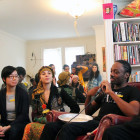
New Zealand Sees Success With Culture-specific Youth Courts, Family Group Conferences
|
Experts estimate that only 15 to 20 percent of youth offenders end up in court in New Zealand. For the remainder of the cases, which are often petty, opportunistic crime, police have the flexibility to make decisions based on the context and details of the case, with a focus both on diverting young people from entering the court system and involving their families and communities in the rehabilitative process.






